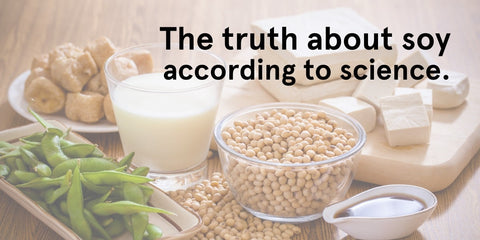A cruel reality: healthy foods and flavourful foods often aren’t the same foods.
You know your body would prefer the steamed broccoli over the crispy pile of fries, but your taste buds are watering for those fries, which makes forking down the broccoli even more of a chore.
When we produced Soylent with the healthiest ingredients available, we knew it wouldn’t matter if it tasted like medicinal sludge.
So, we invested in flavour research, testing, and technology to land on a formula that’s as creamy and delicious as it is nourishing.
Here’s the science behind how we did it.
Key Flavour Factors

Today, people associate protein and meal replacement shakes with the sweet, satiating flavour of chocolate milk. And let’s just say chocolate milk sets a challenging precedent to compete with on the flavour front.
The most prevalent challenge was to create a tasty flavour out of a complex matrix of ingredients including plant-based protein, slow-burning carbs, healthy fats, and vitamins and minerals.
While this potent combination composes the balanced fuel your body craves, each ingredient comes with a distinct flavour profile which, when combined, can produce an awful-tasting mixture.
By utilizing flavour masking technology, mixing in innovative sweeteners like Allulose, and choosing a strategic list of natural flavours, we engineered delicious flavours that mimic your favorite whey protein shakes, but lack any of the crappy ingredients.
Leveraging Flavour Masking Technology

Flavour maskers are flavours that offset the undesirable aftertaste caused by certain ingredients, such as the bitterness of plant-based proteins [2]. Masking solutions and high fat content prevent bitter molecules from coming in contact with our taste receptors and, in turn, prevent us from experiencing unwanted flavours.
The rising market demand for plant-based products has driven innovations in flavour masking technology to help integrate healthy, but bitter plant flavours into popular products.
At Soylent, we’ve been following these advancements and utilizing certain flavour masking technologies to deliver best-in-class flavour profiles in our creamy drink formulas.
Achieving Sweetness

To find the ideal sweetening system, we tested dozens of prototypes made with artificial, natural, and blends of sweeteners. Allulose, a carbohydrate that causes low glycemic response and provides a similar sweetness profile as sugar, was chosen as a key element to both our sweetness profile and our carbohydrate blend.
Natural vs. Artificial Flavours
Most people perceive natural flavours as being healthier than artificial flavours. The truth is that natural flavours are created and processed in a similar manner to the artificial ones. The difference between the two, is that natural flavours are molecules that are present in nature, whereas artificial flavours can be made up of molecules invented in the lab or produced synthetically.
Natural flavours are also often sourced from unexpected ingredients. For example, a blueberry flavoured product labeled as containing “natural flavours” probably does not contain blueberry extract, or anything derived from a blueberry, but rather a mixture of molecules occurring in nature that make the product taste like blueberries.
In the US, both natural and artificial flavour molecules must be reviewed and approved for use by the US Food and Drug Administration (FDA). This assures both of their safety profiles are reviewed with the same standards.
So, if their safety standards are the same and they’re processed similarly, is there really an advantage in choosing natural over artificial flavours? Yes.
Because natural flavours benefit from higher consumer demand, flavour suppliers have invested greater resources into research and development for natural flavours. Opting for natural flavours provides companies like us with a wider range of flavours to choose from to curate better flavour profiles.
Soylenteers Taste Test

To determine exactly which formulas we should bring to market, we consulted our Soylenteers, groups of hundreds of different Soylent users in sites across the country.
We tested multiple prototypes made with different combinations of natural and artificial flavours and sweeteners and different types of carbohydrates.
It took us over a year to improve the taste of our formula. This involved a repeated cycle of formulating, trialing, and testing, listening to tester’s comments, and going back to the drawing board.
Ultimately, our Soylenteers voted for the soft, creamy formulas on the market today. And quite miraculously, these formulas outperformed the market-leading whey-based meal replacement shake, which had been chosen as the gold standard in our consumer tests, but the competition contains 25x more sugar than Soylent!
What’s On the Market Today

Our current formulas contain natural flavours which we found to provide the best profiles of all the prototypes we tested. We also decided to blend allulose with sucralose for a sweetness profile that’s remarkably close to sugar without the high glycemic index and baggage that comes with traditional sugar.
There’s a ton of technology and consideration that goes into producing formulas that are both healthy and flavourful, especially when you’re competing with the flavour of chocolate milk.
But we’re always up for the challenge.
Have a sip and see for yourself.
- The Soylent Team
SOURCES / REFERENCES
[1] Lock, S. (2007), Flavor characteristics of soy products modified by proteases and alpha-galactosidase, Retrospective Theses and Dissertations, 14899. https://lin.dr.iastate.edu/rtd/14899
[2] Mittelheuser, J. (2018), Masking & Blocking: A Tale of Two Technologies, FONA International. https://www.fona.com/masking-blocking-a-tale-of-two-technologies/
[3] Coupland, J. & Hayes, J. (2016). Physical Approaches to Masking Bitter Taste: Lessons from Food and Pharmaceuticals. Pharm Res. 2014 Nov; 31(11): 2921-2939, doi: 10.1007/s11095-014-1480-6





